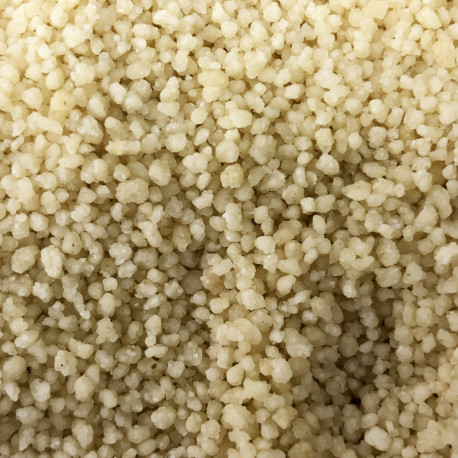- In the process of being restocked




Reference: COUSCOUS1KG
Couscous is a hard grain semolina that is steamed until the small grains are obtained, which are then dried. Couscous is excellent for supplementing the feeding food of nestlings or adults. Wet the couscous with hot water, let it swell for a few minutes then add to the egg food (for 1 teaspoon of couscous plan 4-5 teaspoons of food), coloring, fruit.
Couscous is a hard grain semolina that is steamed until the small grains are obtained, which are then dried. Couscous is excellent for supplementing the feeding food of nestlings or adults. Wet the couscous with hot water, let it swell for a few minutes then add to the egg food (for 1 teaspoon of couscous plan 4-5 teaspoons of food), coloring, fruit.
Clover stimulates the immune system and slows down cellular ageing through its excellent antioxidant properties. Rich in vitamins B, C, E and provitamin A.
Flaxseed is rich in omega 3, which is essential for the cardiovascular system.
Birds like to remove the shells from peanuts and then eat the peanuts. Peanuts are a source of energy, which is very important for the long winter months.
Unpeeled peanuts can be given to parrots as a treat.
Basil 1kg
Basil contains many antioxidants, is anti-inflammatory, and helps against stress. This does not mean that basil is considered a medicine. Dried basil is of course also different from fresh basil plants. But the fact remains: basil is good for health.
Onion seeds are rich in minerals, vitamins, and antioxidants.
Hemp seeds are highly nutritious and contain more essential fatty acids (EFAs) than any other source and are in second place, after soya, for their richness in highly digestible proteins, of high biological value. They are particularly recommended during the breeding seasons in order to stimulate the reproductive instinct of birds.
Hemp seeds are very nutritious and contain more essential fatty acids (EFAs) than any other source and rank second, after soybeans, for their richness in highly digestible proteins of high biological value. They are particularly recommended during reproduction periods to stimulate the reproductive instinct of birds.
Striated sunflower is the basic seed of any parrot mixture. It is also used in mixtures for parakeets and exotic doves.
It is also the favorite food of your outdoor birds during the winter period! Ideal for feeding the birds in your garden.
Practical information for giving sunflower seeds to birds in your garden:
Remember to regularly clean the feeders of your outdoor birds so that diseases and bacteria do not thrive.
Also consider setting feeders high up to prevent predators (such as cats, foxes, etc.) from targeting birds when they are eating.
Millet is used in the diet of all birds: straight beaks and hooked beaks. In clusters, it's a delicacy they love.
Millet in clusters has a good protein and carbohydrate content and it also contains a large number of amino acids. Ideal to distract your birds and thus avoid pecking (pulling feathers).
We advised to give red millet for exotic birds. It is richer in protein than yellow millet.
Flaxseed is composed of 40 to 45% oil and 25% protein. Flaxseed keeps very well. In particular, it contains two fatty acids with similar names (and whose root is the word "flax"), linolenic acid (an omega 3) and linoleic acid.
The seed is used in animal feed, especially for laying hens whose omega 3 content is to be increased.
Through these properties, this seed promotes digestion.
A 100% natural product that is mixed with breeding or with food; It doubles in size by adding water.
Carrots are very rich in vitamins with a high proportion of vitamin A and carotene, as well as vitamin B, calcium and valuable carbohydrates.
Clover stimulates the immune system and slows down cellular ageing through its excellent antioxidant properties. Rich in vitamins B, C, E and provitamin A.
The sunflower seed contains nearly 40% lipids, but also proteins, carbohydrates, and vitamins B and E. A sunflower seed contains approximately 600 kilocalories per 100 g.
It meets the needs of a wide variety of birds throughout the year, including the smallest among them.
Sunflower seeds are a real treat for our birds who love them!

Couscous is a hard grain semolina that is steamed until the small grains are obtained, which are then dried. Couscous is excellent for supplementing the feeding food of nestlings or adults. Wet the couscous with hot water, let it swell for a few minutes then add to the egg food (for 1 teaspoon of couscous plan 4-5 teaspoons of food), coloring, fruit.
